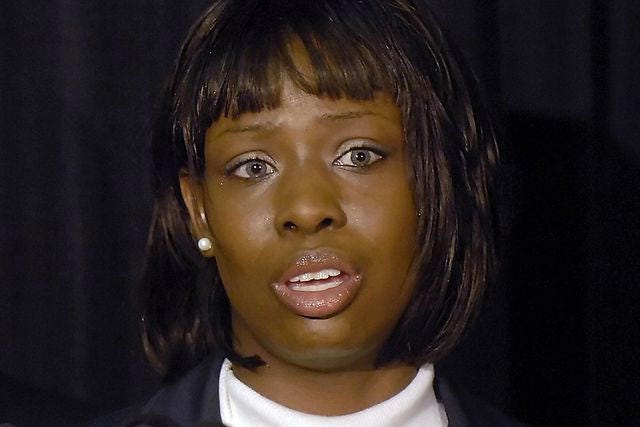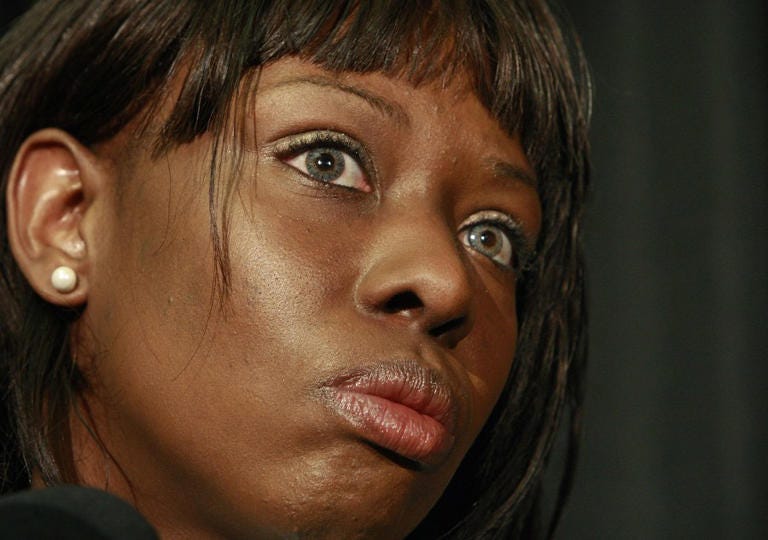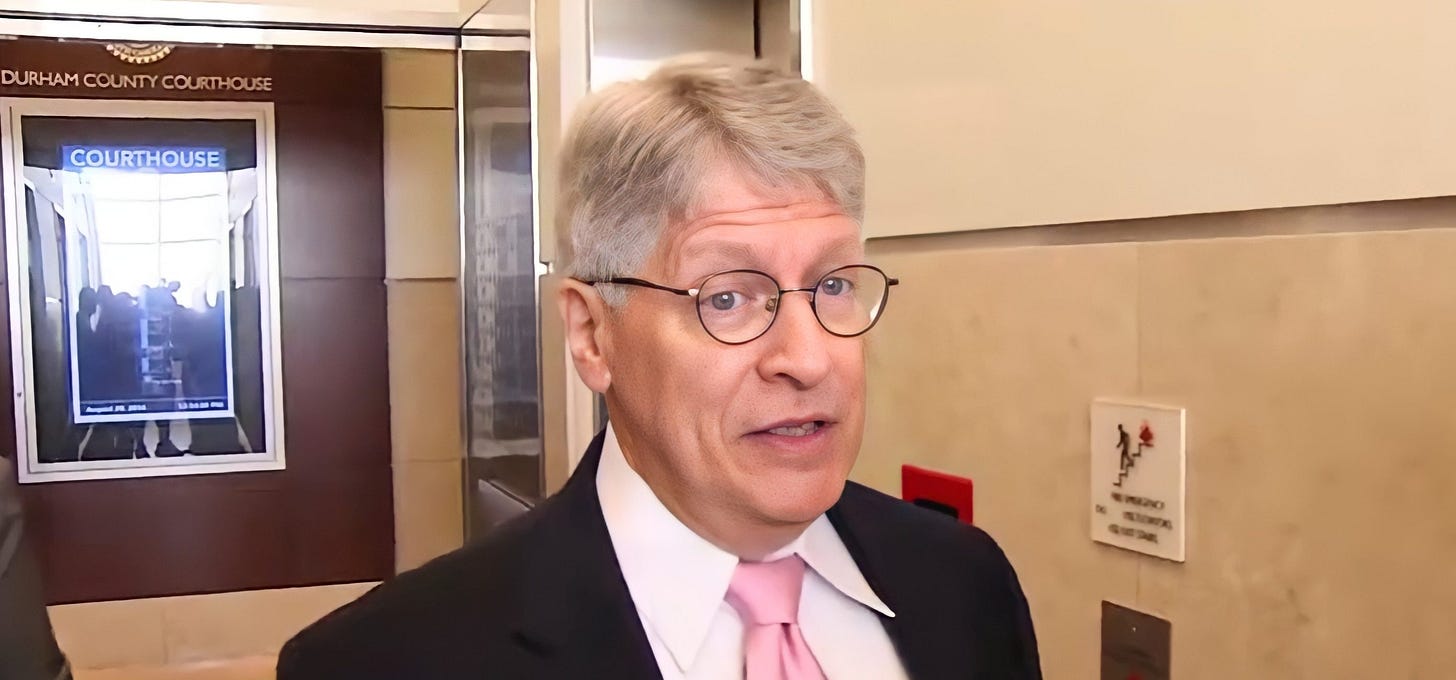Crystal Mangum Wasn't a Unique Liar
This is not an isolated case. The media and law, regrettably, often support lies.

Lying about people to cause them harm in a legal, social, financial, mental health, job or career and if we’re honest, physical way, is psychologically twisted behavior. It doesn’t get anywhere near sufficient media coverage, legal-and-public backlash and punishment. The stories that become public are rare yet one such story hit the news recently and it’s a big one.
Crystal Mangum fabricated rape allegations against three Duke University lacrosse players in 2006 and made a long-overdue confession in November on the Let’s Talk with Kat podcast, hosted by Katerena DePasquale.
Mangum stated what many had suspected for years: that she made false accusations about a rape committed against her by three teammates on the Duke Blue Devils lacrosse team: Dave Evans, Collin Finnerty and Reade Seligmann.
"I testified falsely against them by saying that they raped me when they didn't," Mangum told DePasquale. "And that was wrong and I betrayed the trust of a lot of other people who believed in me.”
Trust given and trust, inarguably, betrayed, as she admits.
A lie to destroy three people was told in 2006. Nearing the end of 2024, Mangum, 18-years later, decided she was willing to confess the facts and truth.
There just wasn’t much of a passionate apology. It was mild, especially considering the extreme nature of the accusations and the misery it forced on to people who didn’t do what they were said to have criminally done.
The interview between Mangum and DePasquale took place, interestingly enough, at the North Carolina Correction Institute for Women, where Mangum is housed and detained for her 14-year sentence for the murder of her boyfriend in 2013.
I say “interestingly enough” because that act, a murder, is in line with habitual behavior to cruelly injure people, for whatever reason when it felt right in the moment.
“Speaking with PEOPLE, Don Yaeger, author of the 2008 bestseller It's Not About the Truth: The Untold Story of the Duke Lacrosse Case and the Lives It Shattered, noted an interview he conducted with one of the accused students, Dave Evans, who feared that he would be remembered for the unfounded allegations of Crystal Mangum not only after being acquitted, but all the way until his death and even afterwards,” reported Ben Brachfeld and Wendy Grossman Kantor.
"The last chapter of my book, I had an interview with one of the three young men," Yaeger recalls, noting the charges had already been dropped by then.
"The young man looked at me and he says, 'You know Don, it doesn't matter what I achieve in my life, it doesn't matter where I go in my career. When I die, it will say Dave Evans, one of the three players accused of raping an adult dancer while at Duke playing lacrosse. That's the way my obituary will open,'" Yaeger recalled of Evans. "That's the penalty."
Judges, prosecuting attorneys, the ‘justice’ system and the court of public opinion rarely, if ever, take this into account. They rarely, if ever, objectively investigate and responsibly, thoroughly investigate for credible facts, evidence and proof in totality.
That’s a significant legal and social weakness.

Don’t think that angry, rage-filled and strategic accusers don’t realize what Evans stated as being true and what is stated in the paragraph following it? The bloodthirst, regardless of the defamatory nature of it, is an impulsive driver of wrongdoing.
“They trusted me that I wouldn’t betray their trust, and I testified falsely against them by saying that they raped me when they didn’t and that was wrong,” said Mangum.
Most people who were lied against either trusted someone or didn’t distrust them. They had to learn the excruciatingly painful way that the trust or peace was misplaced.
I “made up a story that wasn’t true,” Mangum has said. But why?
The explanation she provides is that she communicated a scandalous lie because, honestly or dishonestly, she “wanted validation from people and not from God.”
Mangum did not legally or socially face consequences for her life-altering lying. She’s in prison now, yes (until 2026), but that punishment required a murder to put her there. An attempted murder, figuratively speaking, on three people’s lives was not enough to send her to prison. It took a literal murder.
“Then-state attorney general Roy Cooper chose not to prosecute Mangum for perjury out of concern for her mental health,” Brittany Bernstein reported at National Review. “Now, Mangum can no longer be prosecuted for perjury, as the statute of limitations has lapsed.”
A failure of the entire “justice” system because different parts are in bed together.
Society prefers to believe the Mangum story is a one-off or “1 percent” incident and that it doesn’t matter because of the evil that boys and men actually do and too often get away with unpunished.
While it is corrupt and damning that they ever get away with sexual crimes that doesn’t mean in any logical, moral sense that false accusations or wrongful convictions are tolerable.
The accusers who are making false statements — and those people aligned with them — require severe, painful punishments. Society knows it. Society dismisses it.
Some online conversations have used the faulty reasoning that this wrongdoing is the byproduct of the sexual crimes committed by males. Other voices, shockingly so, additionally believe that a male causing hurt feelings and emotional pain should grant moral permission to females to “retaliate” and do the same with false accusations.
Former Durham County district attorney Mike Nifong is a rotten apple in this story.
In 2006, he declared, confidently or more factually, overconfidently, that “there’s no doubt a sexual assault took place” and that the assault was “racially motivated.”
That the three accused were eventually found innocent and the charges dismissed, of course, is important because Nifong was disbarred in June 2007 for lying in court and withholding DNA evidence that would have proven the players’ innocence.
Remember, legal authority does act this way at times. The justice system doesn’t want to talk about it immediately to prevent it or quickly correct it. It’s legal arrogance and corruption. Nifong did get caught and punished. The vast majority of corruption isn’t caught or punished.
It is proven, yes, that perpetrators have been found “innocent” despite their crimes. That is a big failing of the justice system as well.
In the case of Nifong, that’s not the issue. He was unprofessional, unethical, had an agenda, maybe was experiencing pressure to which he wilted. He appeared biased and conducted himself in a manner that led to painful discipline and punishment in a profession that, again, regularly allows significant wrongdoing without consequences.
Former Duke University president Richard Brodhead felt that he had to suspend the men from school, maybe at attorneys’ recommendations. Then-head men’s lacrosse coach Mike Pressler ended up resigning, likely a forced decision for him.
Evans, Finnerty and Seligmann were deeply hurt and offended and claimed that Brodhead communicated false statements and played a role in preventing a fair trial.
They filed a legal action in response, which resulted in a settlement for them with Duke. The amount was confidential.
Defense lawyer Joseph Cheshire, who represented Evans, Finnerty and Seligmann, issued a statement to ABC11 in Raleigh, North Carolina:
"I am extremely pleased that Crystal Mangum finally decided to tell the truth,” he said.
“For those of us that were involved in the Duke lacrosse case, there was never a question as to the innocence of these young men. It was a travesty of justice caused by one prosecutor's corrupt effort to win an election at the expense of three innocent people.
“Prosecutorial misconduct can have a devastating impact on the administration of justice by causing wrongful convictions of innocent people and must be carefully guarded against.
“Although Ms. Mangum's admission is long overdue, it does put the final layer of validation on the unequivocal innocence of these three fine men."

The legal system, and this is the very dirty reality, from investigators to attorneys and judges, are far more truth averse than you can imagine. Yet they are almost always trusted with minimal oversight.
This is of course highly problematic as it allows for far more frequent and severe corruption and errors.
This isn’t to say that it’s all professionals engaging in this behavior. It does mean that it’s much more than a small percentage, despite the blowback that factual assertion will generate. It’s not an admittance that many will easily talk about.
Years ago a judge told me that, “I deal in lies every day.” He added that his job was to “learn who is lying or who is lying the most.”
He was talking about the parties involved. He could have additionally been talking about the legal and judicial system.
This judge had to do this on the spot, with limited information and understanding about the people involved and accompanied by his inherent biases. So, try as he might, how accurate and reliable do you believe he could be — even before the social pressures against believing people being accused of terrible wrongdoing?
I was on an elevator alone one time when someone got on, visibly upset and shaking and expressing seething anger. They vented, not looking at me or strangely, even noticing my presence. They vented to process the pain that they felt in the moment.
Something had not gone well in court as they had hoped and planned, so they expressed, again, not to me, but out loud to themselves, how they were going to hurt the other person (in this case, a man), I presume legally and socially.
I said nothing because I wasn’t being addressed.
I thought to myself, “Where is a judge to hear this because standing in a courtroom, if someone being falsely accused suggested a lie was being told, they would be quickly dismissed or scolded,” and highly likely lose their hearing.
Once, I respectfully, softly mentioned to a retired judge in his chambers that someone was “not telling the truth.” I mentioned it a second time moments later and was curtly told that “if you say that (the other person) is dishonest again, you’re going (to be punished).”
Facts and truth, because of confirmation bias, not only are regularly frowned upon in certain cases, they are strictly prohibited by people in authority, who will react by flexing their power to intimidate.
The general public and media almost never know and understand what goes on, figuratively speaking, behind the dark curtain of the legal system.
This newsletter — Reputation Intelligence — is written by Michael Toebe, and is a product of Reputation Intelligence - Reputation Quality, a firm which helps individuals and organizations assure a greater peace of mind, provide stress relief through reliable decision analysis, consulting, advisory and communications.
Professional analysis and opinion — consulting — advisory
Reputation Communications — Defamation Response — Speaking Engagements
Crisis Communications — Crisis Management










